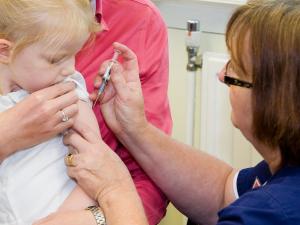Immunisation for preschool children
Before children start school, they need two booster vaccines. One vaccine protects them against diphtheria, tetanus, whooping cough and polio. The other vaccine boosts your child’s immunity to measles, mumps and rubella. Your child receives these vaccines when they’re around three years and four months old.
Why your child might not get a vaccine
There are some reasons why immunisation might not be right for your child. It’s important to tell your GP or nurse about any illnesses or allergies your child has had. Before vaccination, the doctor or nurse needs to know if your child:
- has a very high temperature, vomiting or diarrhoea on the day of the appointment
- has had convulsions or fits
- had a bad reaction to a previous immunisation
- is allergic to anything
- has a bleeding disorder
- has had treatment for cancer
- has an illness that affects the immune system, for example, leukaemia, HIV or AIDS
- takes medicine that affects the immune system, for example, high dose steroids or treatments given after organ transplant or for cancers
- has any other serious illness
Knowing about your child’s health helps the doctor or nurse choose the best immunisations. A family history of illness doesn’t mean your child cannot have a vaccination.
Getting the vaccines

The Child Health system or your doctor’s surgery usually sends out your invitation to make vaccination appointments.
Your child will get the vaccines as two injections in one day.
Diphtheria, tetanus, pertussis and polio (DTaP/IPV) vaccine
This vaccine protects your child against:
Side effects of the DTaP/IPV vaccine
After vaccination, some children experience mild side effects including:
- feeling irritable
- a mild fever
- a small lump for a few weeks where they had the injection
If your child shows any other reaction to the vaccine, tell the doctor, practice nurse or health visitor.
Allergic reactions to a vaccine
On rare occasions, children may experience an allergic reaction to a vaccine, which can cause:
- a rash or itching
- difficulty breathing or collapse, also known as anaphylaxis
Anaphylaxis
Anaphylaxis (serious allergic reactions) after vaccine is extremely rare and only occurs in around one person for every million doses given.
Anaphylaxis can happen within minutes of a child getting vaccinated. This reaction means your child is allergic to an ingredient in a vaccine.
It’s a worrying and rare side effect that can be treated to allow a quick and full recovery. Before your child has further vaccines, you must tell the doctor or nurse about any previous allergic reaction.
When a child has a fit after vaccination
Having a fit is a rare side effect of the vaccine. A child can have a fit due to a very high temperature.
Measles, mumps and rubella (MMR) vaccine
This vaccine protects against three infectious diseases:
If your child didn’t get their first MMR vaccine when they were younger, they need two doses one month apart before they start school.
Getting the vaccine is much safer than having an infectious disease.
Side effects of the MMR vaccine
Your child may have redness and swelling in their arm where the injection was given. MMR has three vaccines in one injection. The vaccines work at different times and can cause side effects.
Side effects of the measles part of the vaccine
About a week to 10 days after MMR vaccination, when the measles part of the vaccine starts to work, some children might become feverish, lose their appetite and develop a measles-like rash. This may last about one to two days.
Side effects of the rubella part of the vaccine
About two weeks after vaccination, when the rubella part of the vaccine starts to work, your child might get a rash of small bruise-like spots. This is a rare side effect. If you see this rash, tell your doctor. The rash usually heals without treatment.
Side effects of the mumps part of the vaccine
About three weeks after vaccination, when the mumps part of the vaccine starts to work, your child might get a mild form of mumps. This is a rare side effect and will heal without treatment.
Allergic reactions to the MMR vaccine
One child in every 500,000 has an allergic reaction to the MMR vaccine. Treatment leads to a quick and full recovery.
Encephalitis
One child in every million vaccinated develops encephalitis, an inflammation of the brain.
One child in every 5,000 infected with measles develops encephalitis.
Treating a fever
When your child gets these vaccines, you don’t need to give them liquid paracetamol to prevent a fever developing. If their temperature is 38˚C or higher, they have a fever. You can treat them at home by:
- keeping them cool
- giving them cold drinks
- giving them liquid paracetamol
Never give your child any medicines containing aspirin.
If their temperature is 39˚C or higher, or they have a fit, contact the doctor immediately.
Yellow Card Scheme
A parent or carer can use the Yellow Card Scheme to report side effects of vaccines and medicines.